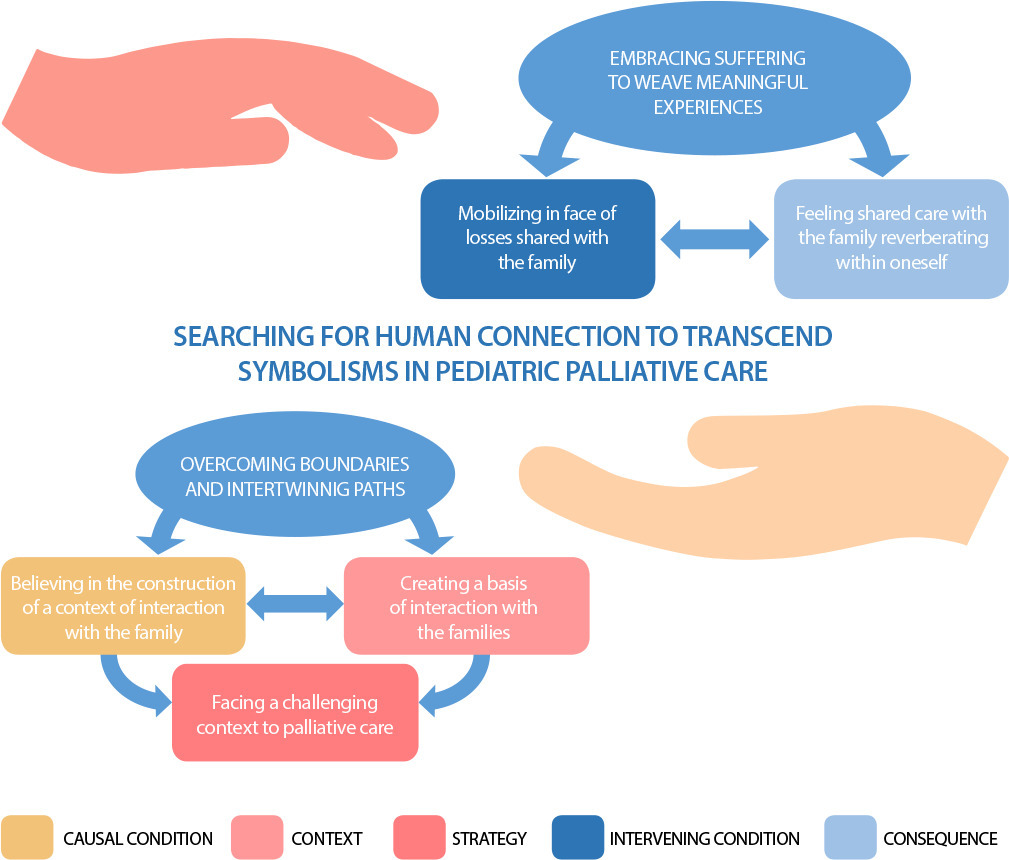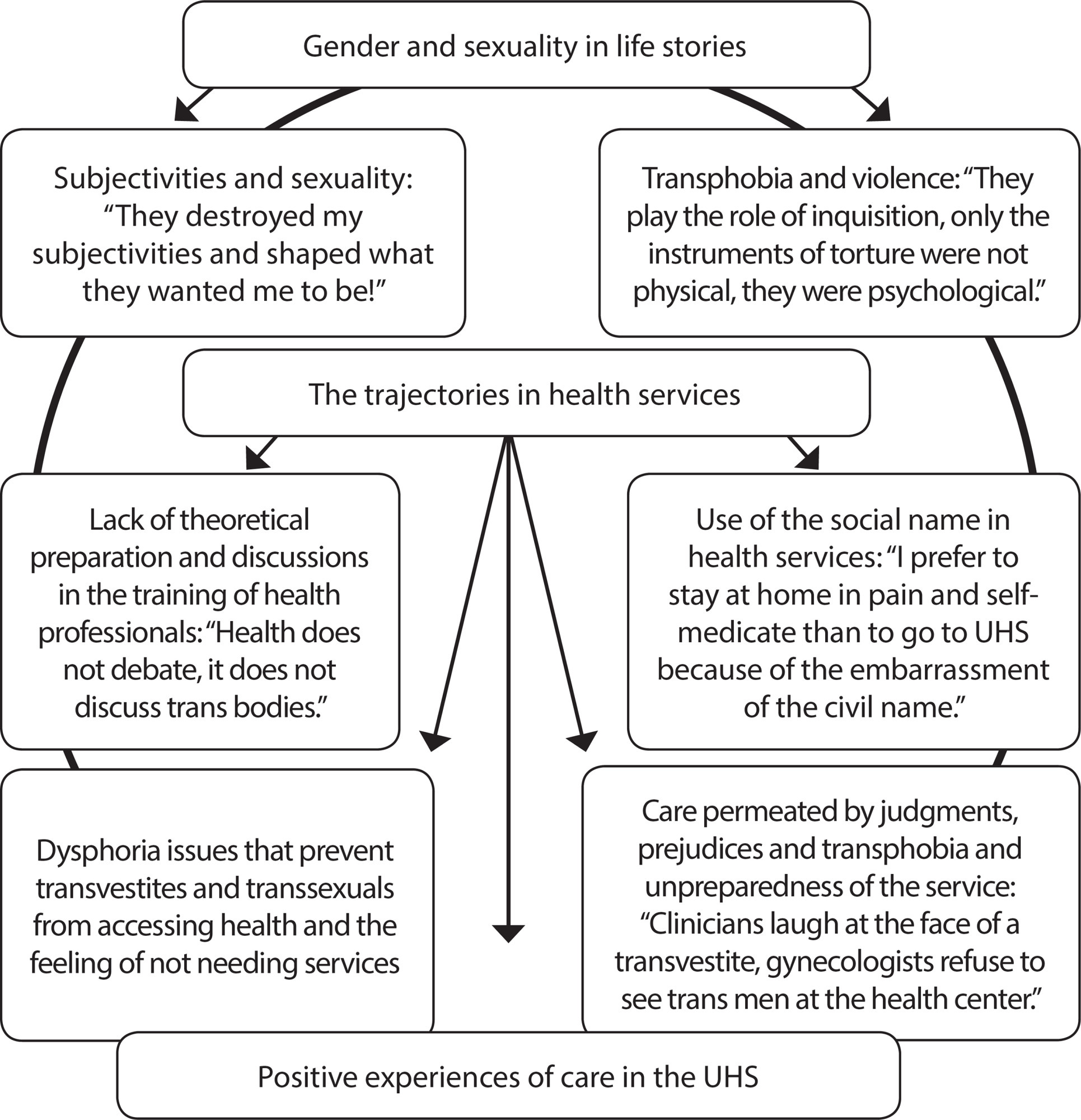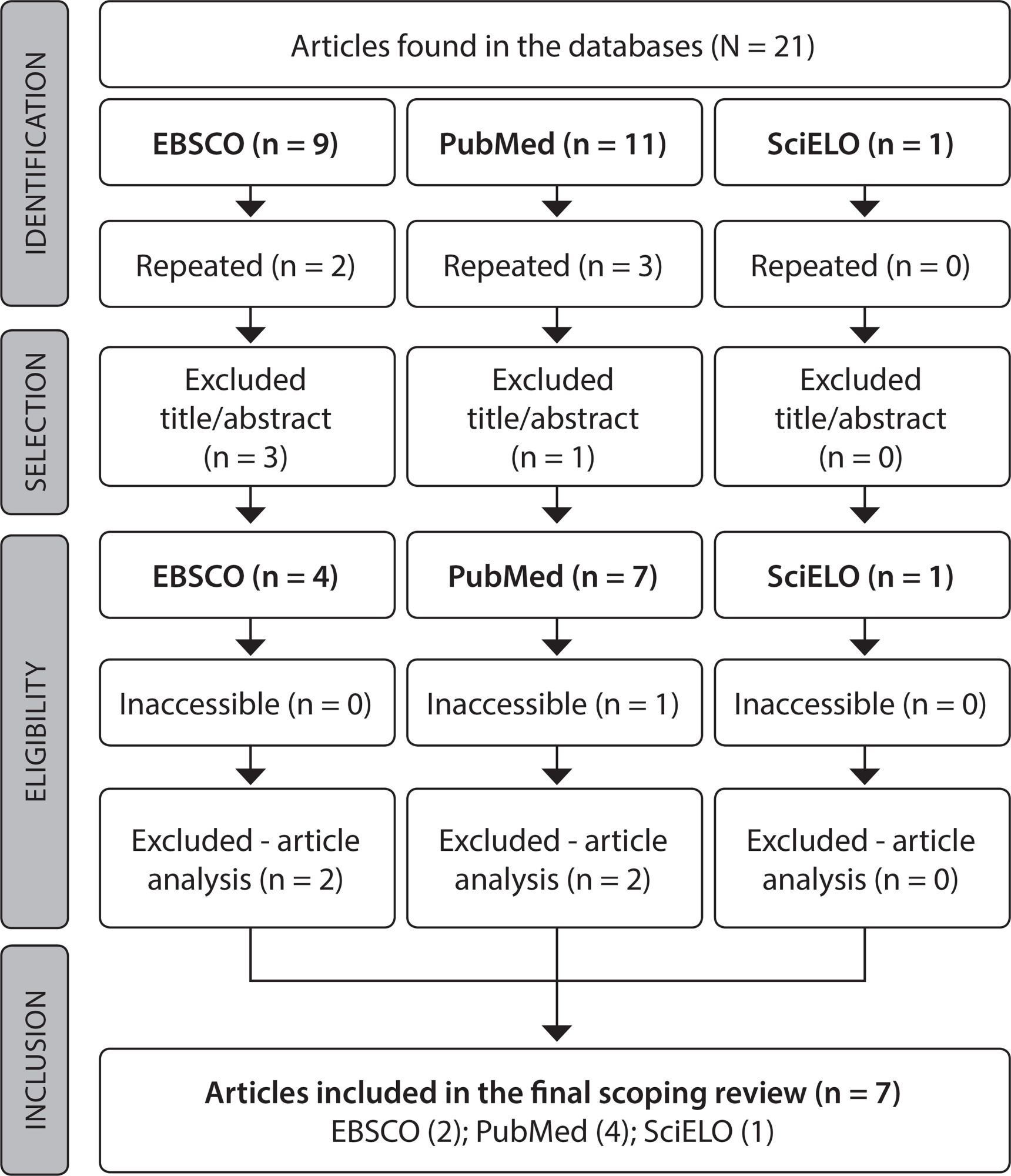-
REVIEW06-26-2023
Nursing care directed to burned patients: a scoping review
Revista Brasileira de Enfermagem. 2023;76(3):e20220205
Abstract
REVIEWNursing care directed to burned patients: a scoping review
Revista Brasileira de Enfermagem. 2023;76(3):e20220205
DOI 10.1590/0034-7167-2022-0205
Views0See moreABSTRACT
Objectives:
to identify in the literature and summarize nursing care in a hospital environment directed to patients who suffered burns.
Methods:
a scoping review, according to the JBI Reviewers’ Manual recommendations, with a search in the MEDLINE, CINAHL, Web of Science, Scopus databases and in the Virtual Health Library portal, through articles published between 2016 and December 2021.
Results:
of the total 419 articles found, nine were selected for analysis. The main care measures identified were changing dressings and types of coverage, vital sign control, non-pharmacological techniques for pain relief and opioid reduction.
Conclusions:
the complexity of burn care requires constant updating by the nursing team. Keeping it prepared to carry out the best nursing care practices for burn patients will promote adequate care, patient recovery and reduction of possible harm.

-
ORIGINAL ARTICLE06-26-2023
Searching for human connection to transcend symbolisms in pediatric palliative care
Revista Brasileira de Enfermagem. 2023;76(3):e20220476
Abstract
ORIGINAL ARTICLESearching for human connection to transcend symbolisms in pediatric palliative care
Revista Brasileira de Enfermagem. 2023;76(3):e20220476
DOI 10.1590/0034-7167-2022-0476
Views0See moreABSTRACT
Objectives:
to present a theoretical model for the interactional context of health professionals and families of children and adolescents under palliative care.
Methods:
qualitative study based on the theoretical frameworks of Grounded Theory and Symbolic Interactionism. Ten palliative care professionals took part in this study through semi-structured interviews employing snowball technique from 2020 to 2021.
Results:
the comparative data analysis resulted in the theoretical model “Searching for human connection to transcend symbolisms in pediatric palliative care”. It reveals symbolic elements that substantiate the construction of a collaborative context integrating two phenomena: “Overcoming boundaries and intertwining paths” and “Embracing suffering to weave meaningful experiences”. Symbolisms in palliative care guide the behavior of families and professionals, which makes them the key factor to be managed.
Final Considerations:
symbolisms and suffering continually integrate the interactional experience of professionals. Empathy and compassion are fundamental elements to enable their connection with families.

-
LETTER TO THE EDITOR06-26-2023
Striving for vessel health preservation through standardized assessment: a Letter to the Editor
Revista Brasileira de Enfermagem. 2023;76(3):e2023760301c
Abstract
LETTER TO THE EDITORStriving for vessel health preservation through standardized assessment: a Letter to the Editor
Revista Brasileira de Enfermagem. 2023;76(3):e2023760301c
DOI 10.1590/0034-7167.2023760301c
Views0Dear Dr Dulce Aparecida BarbosaEditor in Chief of the Revista Brasileira de Enfermagem[…]See more -
REVIEW06-26-2023
Barriers to Pre-Exposure Prophylaxis (PrEP) use for HIV: an integrative review
Revista Brasileira de Enfermagem. 2023;76(3):e20210963
Abstract
REVIEWBarriers to Pre-Exposure Prophylaxis (PrEP) use for HIV: an integrative review
Revista Brasileira de Enfermagem. 2023;76(3):e20210963
DOI 10.1590/0034-7167-2021-0963
Views0See moreABSTRACT
Objectives:
to identify and synthesize scientific evidence on the barriers and difficulties for Pre-exposure Prophylaxis (PrEP) use and compliance for HIV.
Methods:
an integrative literature review, using the MEDLINE/PubMed, Cumulative Index to Nursing and Allied Health Literature (CINAHL), Academic Search Premier and Scopus (Elsevier) databases.
Results:
all (100%) the articles included identified that PrEP users experience some type of structural barrier related to health services such as long distance from the units, suboptimal logistics for taking pills and professional resistance to prescribing PrEP. Furthermore, 63.21% identified social barriers, such as stigma about sexuality and HIV, in addition to individual barriers such as alcohol use, adverse effects, and concerns about long-term toxicity.
Conclusions:
the barriers to PrEP use are multifactorial. Effective interventions are needed to support PrEP users in accessing, complying with, and retaining health services.

-
ORIGINAL ARTICLE06-26-2023
Effect of video on satisfaction and self-confidence in simulation training: a randomized clinical trial
Revista Brasileira de Enfermagem. 2023;76(3):e20220366
Abstract
ORIGINAL ARTICLEEffect of video on satisfaction and self-confidence in simulation training: a randomized clinical trial
Revista Brasileira de Enfermagem. 2023;76(3):e20220366
DOI 10.1590/0034-7167-2022-0366
Views0See moreABSTRACT
Objectives:
to identify the effect on satisfaction and self-confidence of undergraduate nursing students after using a validated bed bath video during the simulation.
Methods:
blinded parallel randomized clinical trial. Participants were allocated to the control group (simulation with tutor) or intervention (simulation with video). After the interventions, the Student Satisfaction and Self Confidence with Learning Scale was used to assess satisfaction and self-confidence. The study was approved by the Ethics Committee and Brazilian Registry of Clinical Trials. Mann Whitney, Fisher Exact and Student t statistical tests were used. A significance level of 5% was adopted. Results: fifty eight students (30, control; and 28, intervention) were evaluated. There was no significant difference between the groups regarding satisfaction (p=0.832) and self-confidence (p>0.999).
Conclusions:
satisfaction and self-confidence were similar between the groups, and the two strategies could be used in the simulated practice of bed bathing.

-
05-29-2023
Absenteeism in child health services: a systematic review
Revista Brasileira de Enfermagem. 2023;76:e20210805
Abstract
Absenteeism in child health services: a systematic review
Revista Brasileira de Enfermagem. 2023;76:e20210805
DOI 10.1590/0034-7167-2021-0805
Views0See moreABSTRACT
Objectives:
to analyze data from qualitative studies related to the phenomenon of health follow-up dropout of newborns, infants and preschoolers in child health services.
Methods:
systematic review, carried out in 19 information bases. Studies were included that portray the reasons for dropping out health follow-up of children up to five years old. The JBI methodology was used for systematic reviews of qualitative evidence.
Results:
we identified 20,199 studies. After applying the eligibility criteria, 81 were selected. Seven were excluded due to duplicity, resulting in 74 articles that were read in full. After this phase, three articles were selected for the final sample and later after reading their references, one more was included, totaling four articles for critical analysis.
Conclusions:
the synthesized findings highlight that health follow-up dropout is based on personal knowledge and beliefs, the family routine dynamics and access to services.

-
ORIGINAL ARTICLE05-29-2023
Quality of life from women’s perspective in the exercise of sex work: a study of social representations
Revista Brasileira de Enfermagem. 2023;76:e20220169
Abstract
ORIGINAL ARTICLEQuality of life from women’s perspective in the exercise of sex work: a study of social representations
Revista Brasileira de Enfermagem. 2023;76:e20220169
DOI 10.1590/0034-7167-2022-0169
Views1See moreABSTRACT
Objectives:
to analyze the social representations elaborated by sex workers from Alto Sertão Produtivo Baiano about quality of life.
Methods:
a qualitative study, based on the Social Representation Theory, carried out in the region of Alto Sertão Produtivo Baiano, with 30 sex workers. Individual in-depth interview was carried out, with speeches organized in a corpus and treated in IRAMUTEQ, enabling lexical analysis for Descending Hierarchical Classification.
Results:
four thematic classes emerged, in which social representations of quality of life pervade: money earned to supply needs; association with healthy living and obtaining health (physical and mental); balance of emotions (although there are some negative sensations such as fear and anxiety); and faith in a deity.
Final Considerations:
the social representations elaborated by sex workers about quality of life are anchored in concepts, subjective and practical, punctuated by the World Health Organization.

-
ORIGINAL ARTICLE10-28-2020
“Health does not discuss trans bodies”: Oral History of transsexuals and transvestites
Revista Brasileira de Enfermagem. 2020;73:e20190228
Abstract
ORIGINAL ARTICLE“Health does not discuss trans bodies”: Oral History of transsexuals and transvestites
Revista Brasileira de Enfermagem. 2020;73:e20190228
DOI 10.1590/0034-7167-2019-0228
Views0See moreABSTRACT
Objectives:
to understand the life stories and itineraries of transvestites and transsexuals in health services.
Methods:
study with a qualitative approach, anchored in the methodological framework of Oral History. Interviews were conducted and thematically analyzed.
Results:
two themes emerged: 1) gender and sexuality in life stories; and 2) the trajectories in health services. These revealed the challenges in the process of recognizing gender identity before the family and society. The reports show the dilemmas that transsexuals and transvestites face in health care, which ends up generating the removal of this population from services.
Final Considerations:
it has been demonstrated that Oral History can increase knowledge, especially about life histories and trajectories in the health services of transvestites and transsexuals; in addition, information was offered that can assist managers and health professionals in making decisions or caring for these people.

-
ORIGINAL ARTICLE07-10-2020
Working conditions and depression in hospital emergency service nurses
Revista Brasileira de Enfermagem. 2020;73:e20180952
Abstract
ORIGINAL ARTICLEWorking conditions and depression in hospital emergency service nurses
Revista Brasileira de Enfermagem. 2020;73:e20180952
DOI 10.1590/0034-7167-2018-0952
Views0See moreABSTRACT
Objective:
to analyze the presence, intensity and factors related to working conditions for depressive symptoms in hospital emergency nurses in the east of São Paulo.
Methods:
a descriptive, exploratory, quantitative and qualitative study, which applied psychometric scales and interview script.
Results:
nurses (95.24%) had depressive symptoms by the assessment scales by the observer, most with mild and moderate intensity. Inadequate working conditions led to suffering. Factors that trigger depressive symptoms were: disorganized work; harmful relationship with immediate management; inappropriate physician behavior; aggressions; lack of inputs, infrastructure and human resources; professional devaluation. Identified professionals with depressive symptoms who, because they were unaware of being affected by the disorder, did not seek treatment, continued to perform activities that compromised their physical and mental health, promoting damage to the assistance provided.
Final considerations:
high frequency of depressive symptoms. The precarious work environment negatively influenced the care and development of depressive symptoms.
-
ORIGINAL ARTICLE06-01-2020
Nursing students: medication use, psychoactive substances and health conditions
Revista Brasileira de Enfermagem. 2020;73:e20190003
Abstract
ORIGINAL ARTICLENursing students: medication use, psychoactive substances and health conditions
Revista Brasileira de Enfermagem. 2020;73:e20190003
DOI 10.1590/0034-7167-2019-0003
Views0See moreABSTRACT
Objective:
to assess the use of nonprescription psychoactive medications and their associations with psychoactive substance use and health aspects among nursing students.
Method:
a cross-sectional study conducted with 182 students at a nursing school in the city of Vale do Ribeira, Brazil. Sociodemographic information, screening for alcohol, tobacco and other drug use, information on physical and mental health and physical activity practices were assessed.
Results:
more than half of the students (79.2%) used psychoactive drugs without prescription, with a predominance of monthly consumption. Consumption of these drugs was found to be associated with alcohol use, binge drinking, smoking and illicit drug use.
Conclusion:
the findings have implications for the implementation of health promotion strategies among nursing students, in view of lifestyle changes.
-
08-07-2023
Chemsex and its repercussions on the health of men who have sex with men (MSM): a global health perspective
Revista Brasileira de Enfermagem. 2023;76(3):e20230004
Abstract
Chemsex and its repercussions on the health of men who have sex with men (MSM): a global health perspective
Revista Brasileira de Enfermagem. 2023;76(3):e20230004
DOI 10.1590/0034-7167-2023-0004
Views0See moreABSTRACT
Objectives:
to discuss the repercussions of chemsex on the health of men who have sex with men (MSM), contextualizing it in a global health scenario and pointing out the implications for nursing care.
Methods:
theoretical-reflexive study based on scientific literature and concepts related to global health.
Results:
we present the epidemiology of the chemsex phenomenon, the main demands of the field, the reasons why it has become a global public health problem, and the implications for nursing practice.
Final Considerations:
chemsex is growing in all age groups of MSM and is globally benefiting from location-based applications to gain magnitude, finding an important potential audience in the migrant population. Nursing structures can help accelerate the proposal and implementation of biomedical and behavioral measures to address chemsex in its entirety, qualifying care and inducing teamwork with interprofessional collaboration.
-
ORIGINAL ARTICLE05-24-2021
Critical thinking in nursing training: evaluation in the area of competence Education in Health
Revista Brasileira de Enfermagem. 2021;74:e20200979
Abstract
ORIGINAL ARTICLECritical thinking in nursing training: evaluation in the area of competence Education in Health
Revista Brasileira de Enfermagem. 2021;74:e20200979
DOI 10.1590/0034-7167-2020-0979
Views0See moreABSTRACT
Objective:
To analyze the constitution of critical thinking in nursing training in the approach by competence and the integrated curriculum, considering the evaluation process by capturing its challenges, and proposing overcoming strategies.
Methods:
Qualitative. In the first phase of data collection, interviews were conducted with twenty-four professors, nine preceptors, and fifteen students to reconstruct the profile of competence, and in the second phase, a workshop to validate the profile identified challenges and proposals. The Collective Subject Discourse was used to analyze the interviews and the holistic competence reference in reconstructing the profile.
Results:
The critical thinking is built based on experiences in the world of work, and evaluation is the conductor of reflections towards emancipation.
Final considerations:
It signals the importance of professor training in the learning evaluation and working with the collective construction of subjects to overcome challenges that happen in the changes of training.
-
REVIEW11-25-2020
Nurse’s interventions in preventing falls in hospitalized children: scoping review
Revista Brasileira de Enfermagem. 2020;73:e20190409
Abstract
REVIEWNurse’s interventions in preventing falls in hospitalized children: scoping review
Revista Brasileira de Enfermagem. 2020;73:e20190409
DOI 10.1590/0034-7167-2019-0409
Views1See moreABSTRACT
Objectives:
map both nursing interventions for the prevention of falls in paediatric age during hospitalization and the instruments for assessing the risk of falls in paediatrics.
Methods:
scoping review according to the protocol of Joanna Briggs Institute, with acronym PCC (P – children, C – fall preventive nursing interventions and instruments for assessing the risk of falling, C – hospital admission), in three sources of information (EBSCO, PubMed and SciELO).
Results:
the sample consisted of seven articles. The education of the child/family is the basis of the interventions, and the instruments for assessing the risk of falling identified were: Humpty Dumpty Falls Scale, GRAF PIF, CUMMINGS, I’M SAFE and CHAMPS.
Conclusions:
the education of children/parents on preventive measures is important and should be reinforced during hospitalization, using different methodologies. The Humpty Dumpty Falls Scale was the most analyzed.

-
ORIGINAL ARTICLE06-14-2021
Mothers’ knowledge of premature newborn care and application of Kangaroo Mother Care at home
Revista Brasileira de Enfermagem. 2021;74(6):e20200717
Abstract
ORIGINAL ARTICLEMothers’ knowledge of premature newborn care and application of Kangaroo Mother Care at home
Revista Brasileira de Enfermagem. 2021;74(6):e20200717
DOI 10.1590/0034-7167-2020-0717
Views0See moreABSTRACT
Objective:
to identify mothers’ knowledge about premature newborn care and application of Kangaroo Mother Care at home.
Methods:
a descriptive, qualitative study carried out with 15 mothers of premature newborns in a reference Maternal and Child Hospital in northern Brazil using two semi-structured interviews with open- and closed-ended questions. The testimonies were analyzed using thematic analysis technique, proposed by Bardin.
Results:
two thematic categories originated: “Caring for a premature newborn at home: strengths and weaknesses” and “Applying Kangaroo Mother Care at home: new knowledge acquired during hospitalization”.
Final considerations:
the speeches of the interviewed mothers pointed out their knowledge about home care of premature NBs and understanding the importance of Kangaroo Mother Care, mainly acquired and improved with the guidance of professionals during hospitalization and application of the method, in addition to fears, possible difficulties in home care and the need to be better informed at hospital discharge.
-
ORIGINAL ARTICLE05-03-2021
Nursing care for patient in postoperatory heart surgery in the Intensive Care Unit
Revista Brasileira de Enfermagem. 2021;74(2):e20200163
Abstract
ORIGINAL ARTICLENursing care for patient in postoperatory heart surgery in the Intensive Care Unit
Revista Brasileira de Enfermagem. 2021;74(2):e20200163
DOI 10.1590/0034-7167-2020-0163
Views0See moreABSTRACT
Objective:
To investigate the critical nodes related to nursing care for patients in the postoperative period of cardiac surgery.
Methods:
Exploratory study with a qualitative approach. Data collected through semi-structured interviews with 27 members of the nursing team working in the Intensive Care Unit. Material submitted to thematic analysis.
Results:
Three categories emerged: Flaws in the professional qualification for patient care in the postoperative period of cardiac surgery; Team challenges concerning specific patient care in the postoperative period of cardiac surgery; and (dis) organization of work in the Intensive Care Unit and its impact on nursing care for patients in the postoperative period of cardiac surgery.
Final considerations:
Given the identification of the critical nodes, the professionals presented suggestions to overcome daily difficulties: investments in strategies for Permanent Education in Health; creation of tools to guide patient assistance in the postoperative of cardiac surgery; and provision of adequate human resources.
Search
Search in:
Nuvem de Tags
Adolescente (85) Atenção Primária à Saúde (239) COVID-19 (91) Criança (91) Cuidados de Enfermagem (269) Educação em Enfermagem (151) Educação em Saúde (139) Enfermagem (930) Enfermagem Pediátrica (86) Estudantes de Enfermagem (77) Estudos de Validação (131) Família (87) Idoso (208) Promoção da Saúde (99) Qualidade de Vida (104) Saúde do Trabalhador (86) Saúde Mental (145) Saúde Pública (82) Segurança do Paciente (150) Tecnologia Educacional (100)



